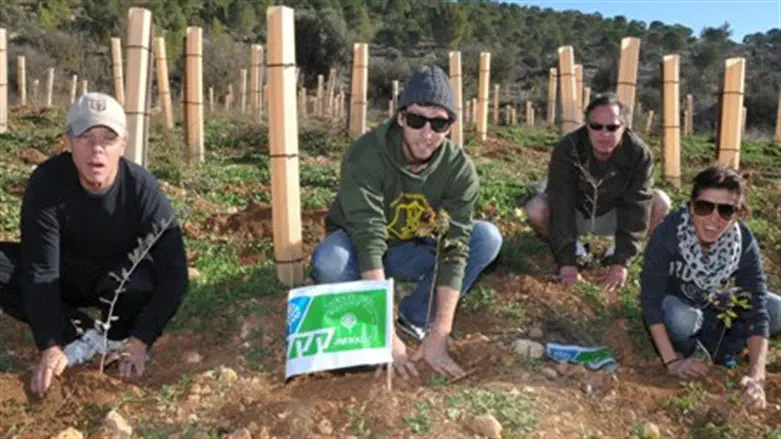
Horrors! A Jewish filmmaker from Toronto thinks he has “discovered” evidence of Israeli misbehavior in 1948. Well, I’ve done a little research, and I’ve discovered some uncomfortable information about the filmmaker’s own home town.
At the center of this manufactured controversy is Jason Sherman, whose interest in Israel seems to have been minimal for most of his life until he was 50 years old, in 2012. According to his film, what triggered Sherman’s belated interest was his desire to locate the exact tree which the Jewish National Fund planted with the bar mitzvah money he contributed.
Of course, the very notion of finding that tree was absurd, since the JNF does not put name tags on the millions of trees that it has planted and, I hope, will continue to plant. But Sherman decided that his tree “must” be located in the area called Canada Park, along the highway to Jerusalem, and perhaps it is.
Canada Park, by the way, is where several battles of the heroic Maccabees against the invading Greek armies took place, over 2000 years ago, when there was no area called Palestine and certainly no Palestinian Arabs..
For those, like Sherman, who don’t recall the history of that highway, it is worth pointing out what happened there during the 1948 Arab War of Annihilation against Israel. Arab military forces in the villages of Imwas, Bayt Nuba, and Yalu, situated near the Jerusalem road, terrorized Jewish traffic in 1948, cutting off Jerusalem from supplies and nearly starving out its inhabitants. Many Israeli soldiers gave their lives to bring those desperately needed supplies to the Holy City.
When Israel liberated the area in the 1967 war, Defense Minister Yitzhak Rabin was faced with a dilemma. He could have left the villages where they were, and hope and pray that they would not again be used to terrorize Jerusalem traffic in some future war. Or he could have razed the villages, to ensure the safety of all who use the vital highway leading to Israel’s capital.
Rabin decided to raze them. The inhabitants were not killed or injured, but they were forced to relocate. For most Israelis, it seemed like the kind of unfortunate but necessary decision that the Arabs’ wars have sometimes forced Israel to make.
But for a filmmaker from comfortable Toronto, a city that is not threatened with annihilation by its neighbors, Rabin’s decision seems cruel and unjustified. Jason Sherman’s film, as described by the Times of Israel, portrays Rabin’s action in the most negative terms possible. The film also berates the Jewish National Fund for planting pine trees in Canada Park, because those trees “are not indigenous to the region.”
I thought that particular allegation was particularly interesting, because guess who is not indigenous to the region where Toronto is located?
The original inhabitants of the Toronto area, centuries ago, are known as the First Nations. They included the native tribes known as the Anishinaabes and the Iroquois. Nearly half the region’s Indigenous people were wiped out by diseases that European settlers brought in the 1600s.
The dominant local tribe when large numbers of illegal European settlers began showing up in the 1700s were the Mississaugas. Some of the settlers were British, some were French. You can bet none of them asked the Mississaugas for permission to enter their land.
After the American revolution of 1776, some colonists who were loyal to the English Crown fled north and joined their compatriots in the Toronto area. Apparently they felt they had a right to just go into somebody else’s country without asking.
In 1787, the British “governor in chief” of the Toronto area—not elected by the Indigenous residents, it should be noted—purchased land in the region from the Mississaugas for a fraction of what it was actually worth. The Mississaugas soon realized they had been cheated and complained, but it was too late. It took them over 200 years (!) to get some compensation—in 2010, legal action netted their descendants a sum that still represented a tiny portion of what the land is worth. In the meantime, of course, the settlers established themselves, expanded, and named their city “Toronto.” How nice for filmmaker Jason Sherman. How sad for the land’s real owners.
Yitzhak Rabin had a lot more justification for dismantling (and relocating without harm) the towns that terrorized Jerusalem traffic than the European imperialists had for decimating Toronto’s original residents through disease and then cheating them out of their land.
In his interview with the Times of Israel, Sherman said that the tree-planters of the Jewish National Fund made him “an accomplice” to an awful crime. Maybe Sherman should take a look in the mirror because it turns out that by continuing to illegally occupy the stolen land on which Toronto was built, he is actually an accomplice to a crime much closer to home.
Stephen M. Flatow, is an attorney the father of Alisa Flatow, who was murdered in an Iranian-sponsored Palestinian terrorist attack in 1995. He is the author of “A Father’s Story: My Fight for Justice Against Iranian Terror.”
